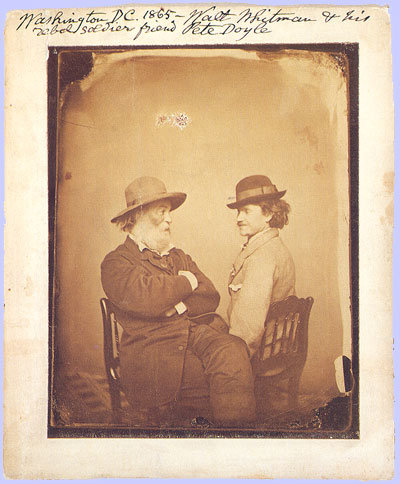
Doyle was a horsecar driver and met Whitman one stormy
night in 1865; they were inseparable for the next eight years. In
1889, Whitman had a remarkable talk with Horace Traubel and Thomas
Harned about the photo; Traubel recalls the conversation:
I picked up a picture from the box by the fire: a
Washington picture: W. and Peter Doyle photoed together: a rather
remarkable composition: Doyle with a sickly smile on his face: W.
lovingly serene: the two looking at each other rather stagily, almost
sheepishly. W. had written on this picture, at the top: "Washington
D.C. 1865--Walt Whitman & his rebel soldier friend Pete Doyle."
W. laughed heartily the instant I put my hands on it (I had seen it
often before)--Harned mimicked Doyle, W. retorting: "Never mind,
the expression on my face atones for all that is lacking in his. What
do I look like there? Is it seriosity?" Harned suggested: "Fondness,
and Doyle should be a girl"--but W. shook his head, laughing
again: "No--don't be too hard on it: that is my rebel friend,
you know,"&c. Then again: "Tom, you would like Pete--love
him: and you, too, Horace: you especially, Horace--you and Pete would
get to be great chums. I found everybody in Washington who knew Pete
loving him: so that fond expression, as you call it, Tom, has very
good cause for being: Pete is a master character." I said: "One
of your powerful uneducated persons, Walt, eh?" W. quickly: "Just
that: a rare man: knowing nothing of books, knowing everything of
life: a great big hearty full-blooded everyday divinely generous working
man: a hail fellow well met-- a little too fond maybe of his beer,
now and then, and of the women: maybe, maybe: but for the most part
the salt of the earth. Most literary men, as you know, are the kind
of men a hearty man would not go far to see: but Pete fascinates you
by the very earthiness of his nobility. O yes, you fellows will know
him: you, Horace, must particularly make it your point to come in
relations with him: you will know him--both of you--and then you will
understand that what I say is wholly true and yet is short of the
truth." (With Walt Whitman in Camden 3: 543)

